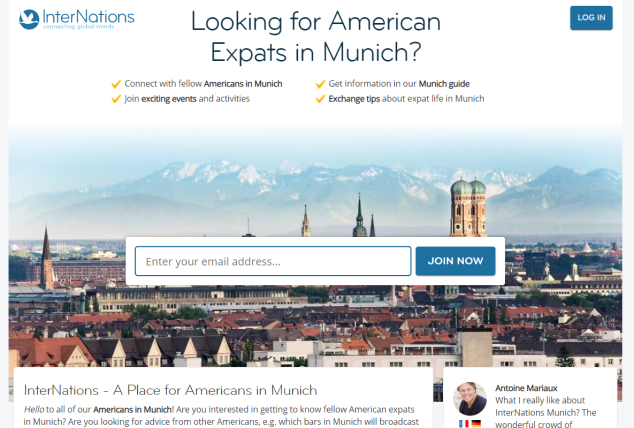In the series “Job Profiles”, we talk to various members of the InterNations team about their position and the work that they do.
For this article, we’ve had a chat with Felix, our resident specialist for search engine optimization (SEO).

When did you join the InterNations Team? What is your current role in our company?
I started working at InterNations in January 2015, and I’ve been part of the team for more than five years now. My official job title is Team Lead Online Marketing SEO, so I obviously belong to the Online Marketing Team and report directly to Stephan, our CFO. However, I work with a lot more people than just my colleagues from online marketing.
Depending on the task at hand, I need to talk with members of other teams and departments, especially from product management, software engineering, and design. And I frequently confer with Valentina, Senior SEO Manager at InterNations Go! — I really enjoy having another SEO expert in the company to bounce ideas off of.
What exactly are your tasks and responsibilities as an SEO manager / team lead?
Actually, the team lead part of my job title is purely nominal at the moment. My current tasks don’t warrant hiring a large SEO team, but due to my previous career level and our company’s organizational structure, this is the position I was hired for. Without the additional responsibilities of a people manager, I can focus fully on the two main topics of search engine optimization (SEO): growing and protecting our organic traffic — all the users who discover InterNations from non-ad-related search results.
So, I try to adapt our content, ideally to what both the users and the search engines need. To a large extent, these two things are now the same: what the user wants to see is also what a search engine such as Google requires, although there are some technical aspects to keep in mind for an SEO project as huge as InterNations, which has literally thousands and thousands of subpages.
Apart from making sure that the organic traffic we already have keeps growing, it’s also my job to ensure that we don’t do anything that makes it hard for Google and other search engines to access and interpret our content; in the latter case, we could end up losing a lot of organic traffic rather quickly. Since organic traffic is free, unlike the other online marketing channels, such as Facebook ads, this is clearly something we wouldn’t want to happen.
I have a bunch of smaller responsibilities as well, although they are technically part of these two bigger topics. These responsibilities include creating and prioritizing new keyword clusters of potential search terms we want to create new content or update old content for, and reacting to changes in the Google search algorithm, which can impact how well our search results rank.

And what are you working on right now?
We just finished a major project a couple of weeks ago. We introduced Word Press as a new content management system (CMS) for SEO purposes. I can now import and update large quantities of SEO-relevant content at the same time.
Lots of our landing pages — like those aimed at users searching for expats in a specific destination or of a particular nationality — used to be hardcoded; they were embedded directly into our source code, and we used a gigantic database to generate their content, a process that was anything but user-friendly. If there was something we wanted to update, we needed to update the entire table in the data base. For example, when the capital of Kazakhstan was renamed from Astana to Nur-Sultan, this caused quite a bit of work for us. Now, thanks to Word Press, I can just change the relevant pages myself, and it takes me about five minutes.
For smaller changes, such as updating the name of a destination, I had to create a ticket for our Product Management and Engineering Teams. In order to run a bigger test — for example, to find out how to optimize certain headlines on the landing pages — I even had to incorporate the experiment into my yearly planning and make it part of our road map. This made us relatively slow and unwieldy when it came to testing and adapting SEO measures. Now, I have the freedom to simply try things myself, and I’m very happy about this!

Now that we have this CMS, there are a few projects I’d like to tackle. We want to update the content on our numerous nationality landing pages (e.g. for US American expats in Munich), and the Product Content Team from the Content & Communications Department has already been working on it. If you use a lot of templates with placeholders for certain parameters, such as “[Greeting in native language] to all expats from [country of origin] in [city name]!”, this comes with certain issues.
On the one hand, it allows you to easily create a lot of SEO content for lots of different subpages. I think we have nearly 20,000 nationality landing pages, and we can hardly write individual copy for 20,000 different webpages. On the other hand, templates are by definition rather generic. Though we prepared several templates to base these landing pages on, the content wasn’t tailored to specific nationalities at all. No matter if you’re from China, France, or the UK, at the moment, you still read more or less the same copy on our respective landing pages.
This is why we’d like to cater more specifically to selected nationalities, starting with US Americans. For major communities where we get a lot of search engine traffic, we’re even planning to write the content manually. In about 30 priority destinations, we’ll no longer use templates at all. I hope that Google will take notice when we introduce this kind of fresh, high-quality content to match selected locations and target audiences.
In addition to this, we’ve started an experiment to test “listicles” as a new content format for our SEO pages.

Can you tell us more about this “listicle” experiment and what it could mean for our SEO strategy?
There was a major change to the Google algorithm that happened in January 2020. Unfortunately, we didn’t really benefit from the latest Google update. This isn’t that unusual in SEO, though. SEO managers then need to do some detective work to figure out how exactly the algorithm might have changed and why it might have affected their business that way.
In this particular case, some people in the industry thought it might be a trust issue. For example, if your company hadn’t received enough top user ratings on websites such as Trustpilot or in the Google app store, it would influence your search results. But I don’t see any correlation there myself. I even saw SEO projects with lots of negative reviews benefit from the algorithm changes. I agree with those who think that the latest Google update was basically about giving users what they want.
Google seems to be moving more and more in the direction of rewarding the kind of search results that users typically click on. That’s why I think the update was all about click-through rate — the number of people who actually click on a search result versus the much larger number of people who merely see it. The content on our landing pages is very factual, whereas Google appears to be ranking entertaining content or “infotainment” with a high click-through rate more prominently right now.
So, we’d like to offer a greater variety of content with these listicles, such as “10 Things All Expats in Berlin Should Know” or “What Expats in New Zealand Shouldn’t Miss Out On”. At the moment, we’re creating these articles for selected countries and cities before we can test a few things about the respective landing pages: Do they actually have a better click-through-rate? What’s the conversion rate like, how many people viewing the page decide to join InterNations, and so on. If the test yields some promising results, we’ll definitely roll it out to our landing pages for as many countries and cities as possible to give them an additional boost.
You just discussed updating our SEO strategy to keep up with Google’s changing algorithm. But what about direct penalties from Google? Have you ever had to deal with this problem?
No, at InterNations, we are lucky that we never did anything that resulted in an actual Google penalty. For example, many companies which optimized their websites for search engines before 2013 or thereabouts used to engage in linkbuilding. They actively approached other websites to ask them for an SEO-friendly link back to their own domain. However, merely asking for links is something that Google now considers to be manipulation and can technically act on. There have even been some prominent cases of companies getting penalized for their link-building efforts!

Fortunately, we don’t need to worry about not getting enough backlinks at InterNations. The results of our annual Expat Insider survey often get links from truly amazing sources, international media, such as the Guardian and the New York Times, for example, and government agencies such as Austria’s Bundesministerium für Familie und Jugend (Federal Ministry for Families and Youth). That’s the kind of high-quality links you can’t ask for or even buy — you have to earn them.
How has the current COVID-19 crisis affected your job? Has it drastically changed the way you work?
Actually, the coronavirus hasn’t changed much of what I’m doing. SEO is based on a long-term outlook: I like comparing it to a huge battleship or oil tanker that you just can’t turn around quickly. There’s no point in reacting to an immediate crisis situation by hastily changing your entire strategy.
However, the current situation has definitely affected the numbers I keep monitoring. For some popular keywords, traffic is down by at least 50–60%, such as search terms related to our events. Obviously, expats will stop looking for events to attend if they can’t even leave their apartment.
This makes it harder to test new SEO measures for the time being. If you want to run a series of tests, you need a smooth baseline to compare new data to, but right now, all the data is far too “noisy”. So, unless you have some excellent reference data from before the global crisis, quite a few experiments will have to wait until the situation gradually returns to normal.
Speaking of long-term developments: How did you become interested in SEO in the first place? And why did you decide to apply at InterNations?
I got into SEO more than 15 years ago, way back when I was still in high school. I was on an unpaid placement as an intern in an “old-school” advertising agency, which focused heavily on print ads and physical advertising, such as posters or stickers on vehicles, that sort of thing.
A lot of their clients had begun to request search engine advertising (SEA), for example, with Google Adwords. As the youngest person in the team, it was somehow assumed that I was good at everything related to computers and the internet, so they asked me to look into it. After creating some websites for our clients’ SEA campaigns, I noticed they got even more clicks from free organic traffic over time. That’s why I started reading up on SEO and tried to apply its principles to other clients as well. My internship turned into my first paid job: I kept working for this agency off and on as a freelancer until I graduated from college with a degree in marketing & communications. And then I started looking for my first full-time job.

After graduating, I worked for a small startup at first, where I was responsible for all aspects of online marketing — SEO, SEA, and social media — but then I landed a job at a major agency, One Advertising AG. Now it has become one of the largest and most-sought-after SEO agencies in Germany, but I was lucky to get started when SEO was really taking off as an industry. Most people in the advertising sector had little experience with it at the time, whereas I’d already been working in the field for several years.
This is how I got my very own department at the agency, leading a team of three to nine employees at a relatively young age. For a recent graduate, it was fun to have this kind of responsibility, as well as a generous salary, and to look after big-name clients such as PayPal or the German hotel-booking platform HRS. But it was also a very fast-paced and intense environment.
When my wife became pregnant, I realized that I wanted to quit after the baby was born — this kind of job just isn’t sustainable as a parent who’s looking forward to spending time with his family. So, I stretched my parental leave over a period of two years, while working as a freelance SEO consultant for international markets. At the agency, I’d really enjoyed the challenge of working with international clients and getting their websites to rank well in different markets outside Germany. Since my wife is a US American expat, I was also looking for jobs at English-speaking companies with an international work environment, so InterNations was a perfect match for me!

Apart from the international aspect, what do you like most about working at InterNations?
My job here is ticket-based and project-based to a large degree, which gives me a lot of flexibility. As an in-house SEO manager, I have the time and the freedom to pick and choose what I consider relevant and to focus on the essential aspects of my work. I can decide for myself what I think will work best, and I find this very satisfying. From a slightly more selfish point of view, I also appreciate that we’ve officially introduced the ReFlex policy for working from home. It is really helpful for working parents since daycare facilities and schools are closed for what feels like a gazillion weeks of vacation per year.
My position also provides me with the opportunity to catch up with SEO managers from other New Work business units and Hubert Burda Media companies. I get to talk shop with lots of very competent people with different kinds of SEO projects and plenty of professional experience. As our discussions usually take place in a protected industry space, the participants aren’t afraid of telling it like it is, sharing data, or raising concerns that would be hard to get insights for in other ways. Exchanging thoughts and ideas with my colleagues from New Work and Burda Media is really one of my most valuable sources of SEO-related information!
Image credit: InterNations / iStockphoto
thanks for the great job
Super Informativ, wieder was dazugelernt
Excellent contribution to the tasks of a seo manager. Many people think it is a simple job, but there is a lot of work behind it. You have really shed light on the topic.
I find it exciting to get an insight into the work of a team lead online marketing SEO and to find out which tasks he has to take care of. Very interesting interview, thank you!
Have amazing content,
very creative thank you.Thank you to sharing your article. It is really amazing for me. Keep continuing sharing your blog post. Thank you very much.